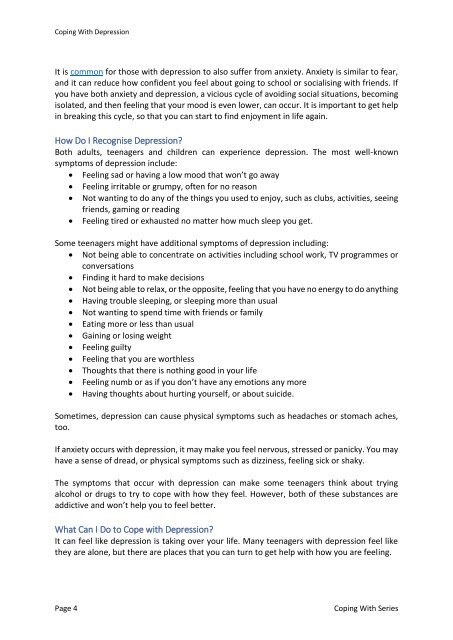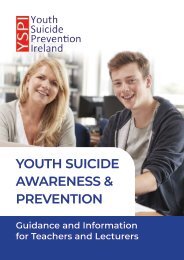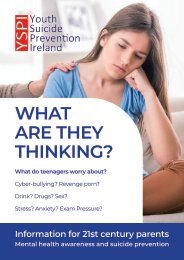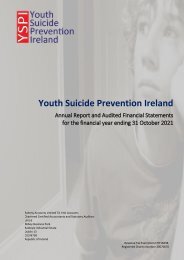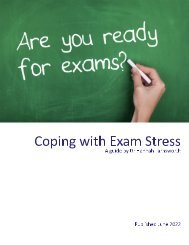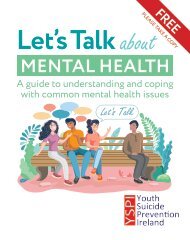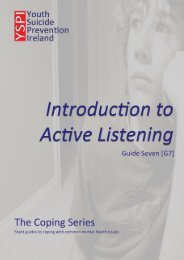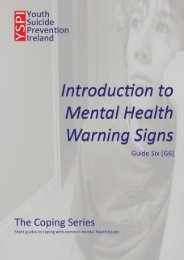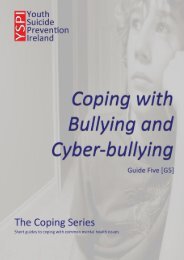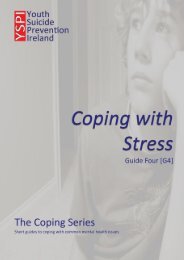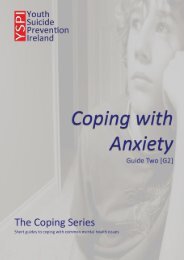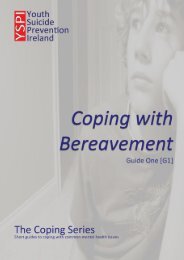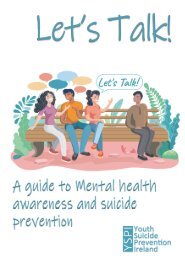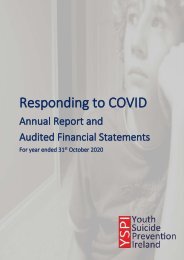CWSG3 - Coping with Depression
This guide is part of the Coping With Series. Each guide provides an introduction to the issue, signs and symptoms to be aware of, coping techniques and information on helping friends and family to cope.
This guide is part of the Coping With Series. Each guide provides an introduction to the issue, signs and symptoms to be aware of, coping techniques and information on helping friends and family to cope.
You also want an ePaper? Increase the reach of your titles
YUMPU automatically turns print PDFs into web optimized ePapers that Google loves.
<strong>Coping</strong> With <strong>Depression</strong><br />
It is common for those <strong>with</strong> depression to also suffer from anxiety. Anxiety is similar to fear,<br />
and it can reduce how confident you feel about going to school or socialising <strong>with</strong> friends. If<br />
you have both anxiety and depression, a vicious cycle of avoiding social situations, becoming<br />
isolated, and then feeling that your mood is even lower, can occur. It is important to get help<br />
in breaking this cycle, so that you can start to find enjoyment in life again.<br />
How Do I Recognise <strong>Depression</strong>?<br />
Both adults, teenagers and children can experience depression. The most well-known<br />
symptoms of depression include:<br />
Feeling sad or having a low mood that won’t go away<br />
Feeling irritable or grumpy, often for no reason<br />
Not wanting to do any of the things you used to enjoy, such as clubs, activities, seeing<br />
friends, gaming or reading<br />
Feeling tired or exhausted no matter how much sleep you get.<br />
Some teenagers might have additional symptoms of depression including:<br />
Not being able to concentrate on activities including school work, TV programmes or<br />
conversations<br />
Finding it hard to make decisions<br />
Not being able to relax, or the opposite, feeling that you have no energy to do anything<br />
Having trouble sleeping, or sleeping more than usual<br />
Not wanting to spend time <strong>with</strong> friends or family<br />
Eating more or less than usual<br />
Gaining or losing weight<br />
Feeling guilty<br />
Feeling that you are worthless<br />
Thoughts that there is nothing good in your life<br />
Feeling numb or as if you don’t have any emotions any more<br />
Having thoughts about hurting yourself, or about suicide.<br />
Sometimes, depression can cause physical symptoms such as headaches or stomach aches,<br />
too.<br />
If anxiety occurs <strong>with</strong> depression, it may make you feel nervous, stressed or panicky. You may<br />
have a sense of dread, or physical symptoms such as dizziness, feeling sick or shaky.<br />
The symptoms that occur <strong>with</strong> depression can make some teenagers think about trying<br />
alcohol or drugs to try to cope <strong>with</strong> how they feel. However, both of these substances are<br />
addictive and won’t help you to feel better.<br />
What Can I Do to Cope <strong>with</strong> <strong>Depression</strong>?<br />
It can feel like depression is taking over your life. Many teenagers <strong>with</strong> depression feel like<br />
they are alone, but there are places that you can turn to get help <strong>with</strong> how you are feeling.<br />
Page 4<br />
<strong>Coping</strong> With Series


